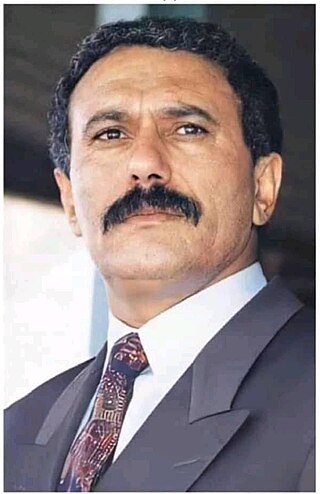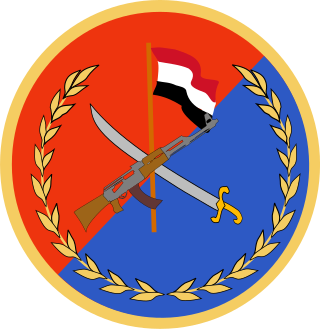Related Research Articles

Ali Abdullah Saleh al-Ahmar was a Yemeni politician who served as the first President of the Republic of Yemen, from Yemeni unification on 22 May 1990, to his resignation on 27 February 2012, following the Yemeni revolution. Previously, he had served as the fourth and last President of the Yemen Arab Republic, from July 1978 to 22 May 1990, after the assassination of President Ahmad al-Ghashmi. al-Ghashmi had earlier appointed Saleh as military governor in Taiz.

The Houthi insurgency, also known as the Houthi rebellion, the Sa'dah War, or the Sa'dah conflict, was a military rebellion pitting Zaidi Shia Houthis against the Yemeni military that began in Northern Yemen and has since escalated into a full-scale civil war. The conflict was sparked in 2004 by the government's attempt to arrest Hussein Badreddin al-Houthi, a Zaidi religious leader of the Houthis and a former parliamentarian on whose head the government had placed a $55,000 bounty.

The South Yemen insurgency is a term used by the Yemeni government to describe the protests and attacks on government forces in southern Yemen, ongoing since 27 April 2009. Although the violence has been blamed on elements within the southern secessionist movement, leaders of the group maintain that their aims of independence are to be achieved through peaceful means, and claim that attacks are from ordinary citizens in response to the government's provocative actions. The insurgency comes amid the Shia insurgency in the country's north as led by the Houthi communities. Southern leaders led a brief, unsuccessful secession in 1994 following unification. Many of them are involved in the present secession movement. Southern separatist insurgents are active mainly in the area of former South Yemen, but also in Ad Dali' Governorate, which was not a part of the independent southern state. They are supported by the United Arab Emirates, even though the UAE is a member of the Saudi Arabian-led coalition working to support the Yemeni government.

Abdrabbuh Mansur Hadi is a Yemeni politician and former field marshal of the Yemeni Armed Forces who served as the president of Yemen from 2012 until 2022, when he stepped down and transferred executive authority to the Presidential Leadership Council, with Rashad al-Alimi as its chairman. He was the vice president to Ali Abdullah Saleh from 1994 to 2012.

The Arab Spring or the First Arab Spring was a series of anti-government protests, uprisings and armed rebellions that spread across much of the Arab world in the early 2010s. It began in Tunisia in response to corruption and economic stagnation. From Tunisia, the protests then spread to five other countries: Libya, Egypt, Yemen, Syria and Bahrain. Rulers were deposed or major uprisings and social violence occurred including riots, civil wars, or insurgencies. Sustained street demonstrations took place in Morocco, Iraq, Algeria, Lebanon, Jordan, Kuwait, Oman and Sudan. Minor protests took place in Djibouti, Mauritania, Palestine, Saudi Arabia and the Moroccan-occupied Western Sahara. A major slogan of the demonstrators in the Arab world is ash-shaʻb yurīd isqāṭ an-niẓām!.

The Yemeni revolution followed the initial stages of the Tunisian Revolution and occurred simultaneously with the 2011 Egyptian revolution and other Arab Spring protests in the Middle East and North Africa. In its early phase, protests in Yemen were initially against unemployment, economic conditions and corruption, as well as against the government's proposals to modify Yemen's constitution. The protesters' demands then escalated to calls for the resignation of Yemeni President Ali Abdullah Saleh. Mass defections from the military, as well as from Saleh's government, effectively rendered much of the country outside of the government's control, and protesters vowed to defy its authority.

Tawakkol Abdel-Salam Khalid Karman is a Yemeni journalist, politician, human rights activist, and revolutionary. She leads the group "Women Journalists Without Chains," which she co-founded in 2005. She became the international public face of the 2011 Yemeni uprising that was part of the Arab Spring uprisings. In 2011, she was reportedly called the "Iron Woman" and "Mother of the Revolution" by some Yemenis. She is a co-recipient of the 2011 Nobel Peace Prize, becoming the first Yemeni, the first Arab woman, and the second Muslim woman to win a Nobel Prize.

The Battle of Sanaa was a battle during the 2011 Yemeni uprising between forces loyal to Yemeni leader Ali Abdullah Saleh and opposition tribal forces led by Sheikh Sadiq al-Ahmar for control of the Yemeni capital Sanaa and, on the part of the opposition, to oust president Saleh.

The following is a timeline of the 2011 Yemeni revolution from January to 2 June 2011. The Yemeni revolution was a series of major protests, political tensions, and armed clashes taking place in Yemen, which began in January 2011, influenced by concurrent protests in the region. Hundreds of protesters, members of armed groups, army soldiers and security personnel were killed, and many more injured, in the largest protests to take place in the South Arabian country for decades.

The Battle of Taiz erupted during the 2011 Yemeni Revolution, between forces loyal to Yemeni leader Ali Abdullah Saleh and opposition protesters, backed by armed tribesmen and defecting soldiers in the southwestern Yemeni city of Taiz.
Hashid Abdullah al-Ahmar is a Yemeni politician who quit his position as Deputy Minister of Youth and Sports over the 2011 Yemeni uprising.
The Alliance of Yemeni Tribes, sometimes referred to as the Yemeni Tribes' Alliance, was an alliance of tribes in Yemen opposed to the government of President Ali Abdullah Saleh. It was formed on 30 July 2011 amidst the civil uprising in Yemen to defend anti-government protesters. Its leader, Sheikh Sadiq al-Ahmar of the Hashid tribal federation, stated his intention to remove Saleh and his sons from power in his capacity as head of the Alliance.
International reactions to the Yemeni revolution were not as pronounced as reactions to similar events during the Arab Spring, but a number of governments and organisations made statements on Yemen before and after the departure of longtime President Ali Abdullah Saleh from power in February 2012.

The Yemeni Republican Guard, formerly called the Strategic Reserve Forces, was an elite formation of the Yemen Army. It was formerly commanded by the former President Ali Abdullah Saleh's son, Ahmed Saleh. It was most notably involved in the 2011 Yemeni uprising, fighting in favour of the Saleh government. The unit was traditionally relied on as the backbone of the regime, and the unit was the best armed and trained in the armed forces. The Defence Ministry both overlooked and engaged in corruption with the unit in order to ensure the loyalty of the unit's leadership.

The following is a timeline of the 2011–2012 Yemeni revolution from 3 June through 22 September 2011. The Yemeni revolution was a series of major protests, political tensions, and armed clashes taking place in Yemen, which began in January 2011 and were influenced by concurrent protests in the region. Hundreds of protesters, members of armed groups, army soldiers and security personnel were killed, and many more injured, in the largest protests to take place in the South Arabian country for decades.

The following is a timeline of the 2011–2012 Yemeni revolution from 23 September through December 2011. The Yemeni revolution was a series of major protests, political tensions, and armed clashes taking place in Yemen, which began in January 2011 and were influenced by concurrent protests in the region. Hundreds of protesters, members of armed groups, army soldiers and security personnel were killed, and many more injured, in the largest protests to take place in the South Arabian country for decades.
Jamal Ahmad al-Sharabi, was a Yemeni photojournalist with the independent weekly, Al-Masdar, in Sana'a, Yemen.
The following lists events that happened during 2011 in Yemen.

The Yemeni crisis began with the 2011–2012 revolution against President Abdullah Saleh, who had led Yemen for 33 years. After Saleh left office in early 2012 as part of a mediated agreement between the Yemeni government and opposition groups, the government led by Saleh's former vice president, Abdrabbuh Mansur Hadi, struggled to unite the fractious political landscape of the country and fend off threats both from Al-Qaeda in the Arabian Peninsula and from Houthi militants that had been waging a protracted insurgency in the north for years.
The battle of 'Amran was a battle that took place in the summer of 2014, between the Houthi rebels and the Yemeni government of President Abdrabbuh Mansur Hadi belonging to units of 310th Armored Brigade, which is backed by Al-Islah loyalists, of which the Al Ahmar clan of Hashid tribes hailed from. The Houthis eventually won the battle, ending the Al Ahmar reign in Amran, and eventually leading them to the capture of Sanaa.
References
- ↑ "Yemen MPs quit ruling party; Several members of General People's Congress resign in protest against violence used against anti-government protesters". Al Jazeera English . 2011-03-05. Archived from the original on 2012-07-09.